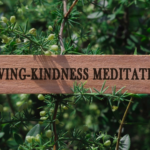Introduction
“Loving-Kindness Meditation for Healing Relationships”Do you know that doing loving-kindness meditation daily can increase your ability? It helps you solve conflicts. It can also deepen your connections with loved ones by up to 30%. Buddhist traditions root this powerful technique. It has the potential to transform even the most strained relationships. It does this by growing compassion, forgiveness, and empathy. By focusing on being kind, people can learn to manage conflicts better. Generating goodwill accomplishes this. This goodwill and kindness should be toward oneself and others. They will also gain a greater understanding of different perspectives. This will strengthen the bonds they share. This includes loved ones, friends, and even casual acquaintances.
Loving-kindness meditation is a type of mindfulness practice. It is also called “metta” meditation. It can affect emotional intelligence, relationship repair, and personal growth. This technique helps practitioners approach themselves with more self-compassion, empathy, and understanding. It also helps them approach their relationships with these qualities. It paves the way for better and more harmonious connections.
Introduction to Loving-Kindness Meditation

Loving-kindness meditation, also called metta meditation, transforms. It has its roots in Buddhism. This meditation technique focuses on growing compassion. It focuses on kindness and goodwill towards oneself and others. You can grow emotional intelligence by mentally repeating positive phrases or “mantras.” These express well-wishes, like “May you be happy,” “May you be healthy,” or “May you live with ease.” They can also feel more connected to their loved ones. This includes friends and even casual acquaintances. Loving-Kindness Meditation for Healing Relationships
What is Loving-Kindness Meditation?
Loving-kindness meditation is at its core a practice. It encourages people to direct their attention inward. They generate feelings of self-compassion. Then, they expand those feelings outward towards others. This mindfulness practice can help people learn to treat themselves better. It can also help them treat their relationships better. They can do this by being more empathetic and understanding. This leads to more fulfilling and harmonious connections.
Benefits of Loving-Kindness Meditation
Regular loving-kindness meditation has many benefits. These include better emotional smarts. They also include improved conflict resolution and greater capacity for forgiveness and empathy. By being self-compassionate and showing it to others. Individuals can better handle the challenges of fixing relationships. They can also strengthen the bonds they share with their loved ones.
Cultivating Compassion through Loving-Kindness

Loving-kindness meditation is about cultivating compassion. This is for oneself and for others. Practitioners can learn to approach themselves and their relationships with more empathy. They can also learn to approach them with more understanding. They do this by focusing on generating goodwill and kindness. This compassion practice helps people move past their biases. It helps you connect with the experiences and feelings of others.
Loving-kindness meditation helps people develop the ability to cultivate real compassion and forgiveness. These are key for fixing and strengthening relationships. They learn to be kind to themselves. Then, they can apply these ideas to how they interact with family. They can also apply them to friends and even casual acquaintances. This promotes emotional smarts and conflict resolution.
By embracing Buddhist traditions, individuals can tap into loving-kindness meditation. It is a powerful source of self-compassion and empathy. This holistic approach to personal growth and relationship repair can transform lives. It helps people navigate their connections. It gives them more clarity, strength, and compassion.
You May Also Like:
Loving-Kindness Meditation: Self-Compassion Mastery 2024
The Power of Self-Compassion
At the heart of loving-kindness meditation lies the transformative power of self-compassion. Many people struggle with harsh self-criticism. It can hurt their ability to connect with others and keep fulfilling relationships. Practitioners can learn to approach their own flaws with greater empathy. They can also understand their own challenges better. They do this by cultivating compassion and kindness towards themselves.
Overcoming Self-Criticism
Mindfulness and compassion practice have a key benefit. They give you the ability to see and fight the harmful effects of self-criticism. Loving-kindness meditation can teach individuals to replace self-judgment with self-acceptance and self-forgiveness. This shift in view improves emotional smarts. It also fosters more self-worth. Self-worth is key for healthy relationships.
Fostering Self-Acceptance
Practitioners explore self-compassion’s depths. They often find a new appreciation for their worth. They also find a willingness to accept themselves, flaws and all. This greater self-acceptance can impact fixing relationships and resolving conflicts. It helps people get better at navigating challenges with more empathy and forgiveness. By embracing their humanity, practitioners can then show kindness to their loved ones. This fosters deeper connections and understanding.
Loving-Kindness Meditation for Healing Relationships

Loving-kindness meditation can heal relationships. It can repair those strained by conflict or misunderstandings. This practice can help people with relationships. It does this by fostering compassion, empathy, and a readiness to forgive.
Understanding Relationship Conflicts
Conflicts and misunderstandings are natural in any relationship. This includes those with a partner, family member, or close friend. Challenges arise from many factors. These include differing views, unmet needs, or past hurts. By being mindful and kind, individuals can learn to resolve conflicts. They must also want emotional intelligence. They can do so in a healthy and constructive way.
Developing Empathy and Understanding
Loving-kindness meditation is about cultivating empathy and understanding. It’s the ability to put oneself in another’s shoes and see the world from their view. This practice helps people appreciate the thoughts of their loved ones. It also helps them understand their feelings and experiences. This fosters more forgiveness and better relationships. By learning to handle conflicts with care and a willingness to listen. People can navigate tough relationships better. They will have more emotional smarts and better conflict skills.
Mindfulness and Emotional Intelligence
Practicing loving-kindness meditation enhances mindfulness and emotional intelligence. Both are crucial for healthy relationships. Understanding one’s own emotions and managing them well helps. It lets individuals navigate relationship challenges better. They can do so with more empathy, conflict resolution, and compassion.
Recognizing and Managing Emotions
Loving-kindness meditation is about building self-awareness. It is also about recognizing and accepting emotions, both good and bad. Through this process of mindful introspection, people can learn to manage their emotions. They can respond to tough situations with more calm and understanding.
By using emotional intelligence, people can build stronger relationships. They will be more fulfilling. This involves the ability to understand others. It means resolving conflicts well. And it means creating a forgiving and kind environment.
Forgiveness and Letting Go
Forgiveness is vital for healing relationships. Loving-kindness meditation can be a powerful tool for growing this key quality. Through this practice, people can learn to let go of resentment and anger. These emotions often block forgiveness and relationship repair.
Releasing Resentment and Anger
Loving-kindness meditation has a key benefit. It helps people let go of resentment and anger. Practitioners focus on feeling compassion and goodwill towards those who have harmed them. This shift helps them understand the other person’s situation and motives better. This change in mindset can pave the way for real forgiveness. It lets people release the burden of negative emotions. Then, they can move forward with a renewed sense of emotional smarts and empathy growth.
Practicing Forgiveness Meditation
Adding forgiveness meditation to loving-kindness meditation can heal relationships and promote self-compassion. It is a powerful tool. This exercise involves visualizing the person who has caused harm. Then, you send them well-wishes and positive intentions. For example, “May you be free from suffering” or “May you find peace and happiness.” By doing this compassion practice, people can let go of resentment. They can then open up to the chance to resolve conflicts and fix relationships.
In the end, forgiveness and letting go through loving-kindness meditation can transform. They help people navigate complex relationships and build deeper connections. Mindfulness and Buddhist traditions form the basis of these connections.
Repairing and Strengthening Relationships

Loving-kindness meditation helps heal strained relationships. It can also strengthen and deepen existing connections. By nurturing compassion, empathy, and emotional intelligence, this practice helps people communicate better. It also helps them build more trust and intimacy with their loved ones.
Communicating with Compassion
Loving-kindness meditation is about the ability to approach relationships mindfully and compassionately. This practice teaches individuals to listen with empathy. It also teaches them to state their needs and feelings . And, to respond to conflicts with more understanding and patience. By adding emotional intelligence to their communication, practitioners can navigate relationship challenges. They will have more forgiveness and conflict resolution skills.
Building Trust and Intimacy
As people deepen their self-compassion, they gain more empathy. They become better at building trust and intimacy in their relationships. Buddhist traditions of loving-kindness meditation promote being willing to be vulnerable. They also encourage active listening. They create a safe space for open and real exchanges. By growing these qualities, couples, families, and friends can build stronger bonds. These bonds can withstand the challenges that come in any healthy relationship.
Incorporating Loving-Kindness into Daily Life

To heal relationships, use loving-kindness meditation. You must add it to your daily life. This can involve adding loving-kindness exercises to a regular meditation routine. It also means consciously using compassion and kindness in all parts of one’s life.
One easy way to cultivate loving-kindness is to set aside a few moments. It can be just a minute or two. In that time, pause and send well-wishes. You can send them to yourself, a loved one, or even a stranger. You can do this by mentally repeating phrases like “May you be happy,” “May you be healthy,” or “May you live with ease.” This practice fosters empathy and emotional smarts. They lead to better conflict resolution and relationship repair.
Also, adding mindfulness and compassion to daily routines. This can happen during meals, commutes, or while doing chores. It can deepen self-compassion. It can also help extend that kindness to others. By being present and attentive, people can better spot and manage their emotions. This will strengthen their relationships and foster more forgiveness and empathy.
The key to adding loving-kindness to daily life is to make it a habit. It should be a natural part of one’s buddhist traditions and personal values. By consistently being compassionate and kind. Individuals can develop a more emotionally intelligent approach to their relationships. It will also be more fulfilling. This leads to greater connection and understanding.
The Buddhist Roots of Loving-Kindness Meditation
Loving-kindness meditation, or “metta” meditation, has its roots in Buddhism. It fits the core principles of the Dharma, the teachings of the Buddha. To appreciate this practice’s power, you must grasp its rich history and spirit.
Understanding the Dharma
The heart of Buddhist philosophy is the Dharma. It includes the teachings and truths. They guide people to freedom from suffering and to enlightenment. The Dharma emphasizes mindfulness, compassion, and an interconnected view of the world. These are key parts of loving-kindness meditation.
The loving-kindness meditation aligns with the Buddhist idea of metta. Metta is a boundless state of goodwill and deep compassion for all beings. This practice encourages practitioners to grow kind, accepting, and understanding feelings. They should feel this way not towards themselves but also towards others. This fosters emotional smarts, empathy, and relationship repair.
Buddhism is the foundation of loving-kindness meditation. It roots the practice in the rich traditions and philosophies of Buddhism. This helps individuals understand the self-compassion and compassion in the technique. This understanding leads to a fuller experience of mindfulness. It also makes conflict resolution more transformative.
Guided Loving-Kindness Meditation Scripts
To help people do loving-kindness meditation, they need guided scripts and instructions. These resources can provide a structured framework for the practice. They help newcomers feel safe. They also help them feel confident as they explore this powerful technique.
Short Loving-Kindness Meditation
For those who want a shorter loving-kindness meditation, a short script can be a good option. Guides lead the sessions. They last about 10-15 minutes. They focus on the core of the practice. This includes cultivating compassion for oneself, loved ones, and even strangers. These mindfulness and compassion exercises help people. They can start to feel the benefits. These exercises help with emotional intelligence, conflict resolution, and empathy in relationships.
Extended Loving-Kindness Meditation
Those who want to learn about loving-kindness meditation can use longer scripts. They offer a fuller experience. The guides lead the sessions, and they last 20-30 minutes. They often include many Buddhist traditions and self-compassion practices. By doing these longer meditations, people can explore forgiveness and fixing relationships. They can delve into the details. This will help them build deeper emotional intelligence. It will help them connect with themselves and others.
Overcoming Challenges in Loving-Kindness Practice
The benefits of loving-kindness meditation are well-documented. But, people may face challenges. They face these challenges. They try to add mindfulness and compassion to their lives. Understanding and fixing these obstacles is crucial. It is key for keeping a consistent and effective loving-kindness meditation practice.
Dealing with Resistance and Skepticism
Practitioners may face a common challenge. It is resistance or skepticism towards loving-kindness meditation. Some people may feel uncomfortable with the idea of directing compassion and goodwill. This is especially true if they have been hurt or had conflicts in their relationships. This resistance can be due to a lack of emotional intelligence. Or, it can be due to difficulty in letting go of negative emotions, like resentment and anger.
To beat this resistance, you must approach with an open mind. You must be willing to explore the benefits. Practitioners can start by focusing on self-compassion. It can help build the base for being kind and forgiving to others. Doing guided loving-kindness meditation or joining a supportive community can also help. They can help people navigate these early challenges. They can also build a more regular practice.
The key to beating resistance is to approach loving-kindness meditation with patience. You need self-compassion and a real desire. You must want to grow in emotional intelligence and empathy. By enduring the initial discomfort. Practitioners can unlock the power of this ancient Buddhist tradition. They can experience the great benefits it brings to their lives and relationships.
Combining Loving-Kindness with Other Mindfulness Practices
Loving-kindness meditation can be powerful alone. You can also combine it with other mindfulness techniques. This combo can further boost its benefits for healing relationships and personal growth. Adding loving-kindness to practices helps. These practices include mindful breathing and body scans. It can grow emotional intelligence. They can also build empathy and stronger self-compassion.
For instance, adding loving-kindness to a mindful walking practice. It can help individuals extend goodwill and kindness. They do so not only to themselves. They also harm the people and environment they encounter along their journey. Similarly, pairing loving-kindness with a body scan meditation can help. It can deepen understanding and acceptance of one’s physical and emotional experiences. This can lead to more self-acceptance and better relationship repair.
By blending loving-kindness with other mindfulness exercises, individuals can create a holistic practice. It addresses many aspects of their personal and interpersonal growth. These include conflict resolution, forgiveness, and the development of compassion and empathy. This approach can help people who want to deepen their connection with themselves. It can also help them connect with others. It can help them create a more harmonious and fulfilling way of relating in their lives.









